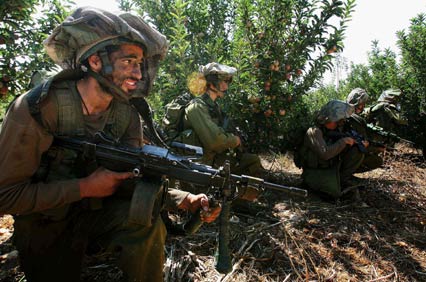Pitched battles raged between Israeli forces and
Hezbollah fighters on the border Thursday, and Israel warned hundreds of
thousands of people to flee southern Lebanon "immediately," preparing for a
likely ground offensive to set up a buffer zone.
|

Israeli soldiers take up positions as they advance towards
Israel-Lebanon border July 20, 2006. Israel's Defence Minister Amir Peretz
raised the possibility on Thursday of a ground offensive into Lebanon in
its war against Hizbollah guerrillas firing rockets over the border.
[Reuters]
|
UN chief Kofi Annan warned of a humanitarian crisis in Lebanon and called
for an immediate cease-fire, even as he admitted "serious obstacles" stand in
the way of even easing the violence. Annan denounced Israel for "excessive use
of force" and Hezbollah for holding "an entire nation hostage" with its rocket
attacks and snatching of two Israeli soldiers last week.
As the death toll rose to 330 in Lebanon, as well as at least 32
Israelis, Lebanese streamed north into the capital and other regions, crowding
into schools, relatives' homes or hotels. Taxi drivers in the south were charging
up to US$400 per person for rides to Beirut, more than 40 times the usual price. In
remote villages of the south, cut off by strikes, residents made their way out
over the mountains by foot.
The price of food, medical supplies and gasoline rose by as much as 500
percent in parts of Lebanon on Thursday as Israel's relentless bombardment
destroyed roads, bridges and other supply routes. The World Food Program said
estimates of basic food supplies ranged from one to three months.
On a day that saw US Marines return to Lebanon for the first time in 22
years, the war looked ready to expand dramatically. Neither side showed any sign
of backing down. Hezbollah refused to release its two Israeli soldiers without a
prisoner exchange, Israel was aiming to create a new buffer zone in a region
that saw 18 years of Israeli presence ending in 2000.
Hezbollah leader Sheik Hassan Nasrallah shrugged off concerns of a stepped-up
Israeli onslaught, vowing never to release two Israeli soldiers captured by his
guerrillas even "if the whole universe comes (against us)." He said they would
be freed only as part of a prisoner exchange brokered through indirect
negotiations.
He spoke in an interview with the Al-Jazeera news network taped Thursday to
show he had survived a heavy airstrike in south Beirut that Israel said targeted
a Hezbollah underground leadership bunker. The guerrillas said the strike only
hit a mosque under construction and no one was hurt.
The United States, which has resisted calls to press its ally Israel to
halt the fighting, was sending Secretary of State Condoleezza Rice to the region,
arriving in Israel on Tuesday or Wednesday after stopping over in Arab nations,
Israeli officials said. They spoke on condition of anonymity because the
schedule was not yet confirmed.
The mission would be the first US diplomatic effort on the ground since the
Israeli onslaught against Lebanon began nine days ago.
Israel has decided air power alone will not be enough to drive Hezbollah back
from the Israeli-Lebanon border and that a ground force will be needed to
establish a zone that is at least 20 miles deep, senior military officials said
Thursday. That would force Hezbollah behind the Litani River.
Israel wants to send a strong message to all its enemies, especially Iran,
that the consequences of attacking the Jewish state will be unbearable.
But mounting civilian casualties and the displacement of hundreds of
thousands of Lebanese could limit the amount of time Israel has to achieve its
goals, as international tolerance for the bloodshed and destruction runs out.
Lebanese Prime Minister Fuad Saniora put the death toll at more than
330, at least 11 of them killed Thursday, with 1,100 wounded. At least 32 Israelis
have been killed, including 17 service members, three of them killed in military
operations Thursday and early Friday.
Saniora said more than 55 bridges across the country had been destroyed, and
that Israeli forces had targeted ambulances and medical convoys.
"This attack is no longer against Hezbollah, it is an attack against the
Lebanese and Lebanon," Saniora told CNN.
The UN estimated that about a half-million people have
been displaced in Lebanon, with 130,000 fleeing to Syria and about 45,000
believed to be in need of assistance.